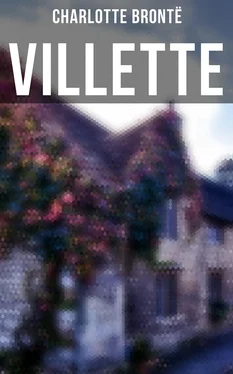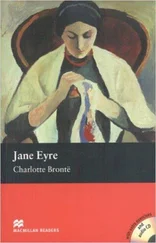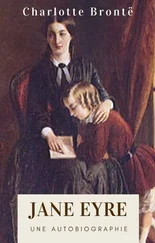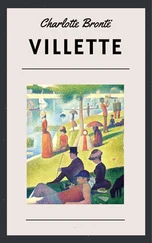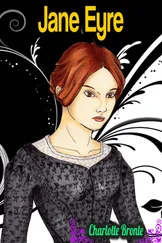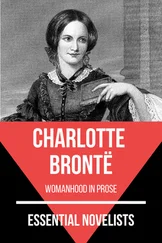“An Englishwoman, as one may see.”
“She speaks French?”
“Not a word.”
“She understands it?”
“No.”
“One may then speak plainly in her presence?”
“Doubtless.”
He gazed steadily. “Do you need her services?”
“I could do with them. You know I am disgusted with Madame Svini.”
Still he scrutinized. The judgment, when it at last came, was as indefinite as what had gone before it.
“Engage her. If good predominates in that nature, the action will bring its own reward; if evil — eh bien! ma cousine, ce sera toujours une bonne oeuvre.” And with a bow and a “bon soir,” this vague arbiter of my destiny vanished.
And Madame did engage me that very night — by God’s blessing I was spared the necessity of passing forth again into the lonesome, dreary, hostile street.
Chapter VIII.
Madame Beck.
Table of Contents
Being delivered into the charge of the maîtresse, I was led through a long narrow passage into a foreign kitchen, very clean but very strange. It seemed to contain no means of cooking — neither fireplace nor oven; I did not understand that the great black furnace which filled one corner, was an efficient substitute for these. Surely pride was not already beginning its whispers in my heart; yet I felt a sense of relief when, instead of being left in the kitchen, as I half anticipated, I was led forward to a small inner room termed a “cabinet.” A cook in a jacket, a short petticoat and sabots, brought my supper: to wit — some meat, nature unknown, served in an odd and acid, but pleasant sauce; some chopped potatoes, made savoury with, I know not what: vinegar and sugar, I think: a tartine, or slice of bread and butter, and a baked pear. Being hungry, I ate and was grateful.
After the “prière du soir,” Madame herself came to have another look at me. She desired me to follow her upstairs. Through a series of the queerest little dormitories — which, I heard afterwards, had once been nuns’ cells: for the premises were in part of ancient date — and through the oratory — a long, low, gloomy room, where a crucifix hung, pale, against the wall, and two tapers kept dim vigils — she conducted me to an apartment where three children were asleep in three tiny beds. A heated stove made the air of this room oppressive; and, to mend matters, it was scented with an odour rather strong than delicate: a perfume, indeed, altogether surprising and unexpected under the circumstances, being like the combination of smoke with some spirituous essence — a smell, in short, of whisky.
Beside a table, on which flared the remnant of a candle guttering to waste in the socket, a coarse woman, heterogeneously clad in a broad striped showy silk dress, and a stuff apron, sat in a chair fast asleep. To complete the picture, and leave no doubt as to the state of matters, a bottle and an empty glass stood at the sleeping beauty’s elbow.
Madame contemplated this remarkable tableau with great calm; she neither smiled nor scowled; no impress of anger, disgust, or surprise, ruffled the equality of her grave aspect; she did not even wake the woman! Serenely pointing to a fourth bed, she intimated that it was to be mine; then, having extinguished the candle and substituted for it a night-lamp, she glided through an inner door, which she left ajar — the entrance to her own chamber, a large, well-furnished apartment; as was discernible through the aperture.
My devotions that night were all thanksgiving. Strangely had I been led since morning — unexpectedly had I been provided for. Scarcely could I believe that not forty-eight hours had elapsed since I left London, under no other guardianship than that which protects the passenger-bird — with no prospect but the dubious cloud-tracery of hope.
I was a light sleeper; in the dead of night I suddenly awoke. All was hushed, but a white figure stood in the room — Madame in her night-dress. Moving without perceptible sound, she visited the three children in the three beds; she approached me: I feigned sleep, and she studied me long. A small pantomime ensued, curious enough. I daresay she sat a quarter of an hour on the edge of my bed, gazing at my face. She then drew nearer, bent close over me; slightly raised my cap, and turned back the border so as to expose my hair; she looked at my hand lying on the bedclothes. This done, she turned to the chair where my clothes lay: it was at the foot of the bed. Hearing her touch and lift them, I opened my eyes with precaution, for I own I felt curious to see how far her taste for research would lead her. It led her a good way: every article did she inspect. I divined her motive for this proceeding, viz. the wish to form from the garments a judgment respecting the wearer, her station, means, neatness, &c. The end was not bad, but the means were hardly fair or justifiable. In my dress was a pocket; she fairly turned it inside out: she counted the money in my purse; she opened a little memorandum-book, coolly perused its contents, and took from between the leaves a small plaited lock of Miss Marchmont’s grey hair. To a bunch of three keys, being those of my trunk, desk, and workbox, she accorded special attention: with these, indeed, she withdrew a moment to her own room. I softly rose in my bed and followed her with my eye: these keys, reader, were not brought back till they had left on the toilet of the adjoining room the impress of their wards in wax. All being thus done decently and in order, my property was returned to its place, my clothes were carefully refolded. Of what nature were the conclusions deduced from this scrutiny? Were they favourable or otherwise? Vain question. Madame’s face of stone (for of stone in its present night aspect it looked: it had been human, and, as I said before, motherly, in the salon) betrayed no response.
Her duty done — I felt that in her eyes this business was a duty — she rose, noiseless as a shadow: she moved towards her own chamber; at the door, she turned, fixing her eye on the heroine of the bottle, who still slept and loudly snored. Mrs. Svini (I presume this was Mrs. Svini, Anglicé or Hibernicé, Sweeny) — Mrs. Sweeny’s doom was in Madame Beck’s eye — an immutable purpose that eye spoke: Madame’s visitations for shortcomings might be slow, but they were sure. All this was very un-English: truly I was in a foreign land.
The morrow made me further acquainted with Mrs. Sweeny. It seems she had introduced herself to her present employer as an English lady in reduced circumstances: a native, indeed, of Middlesex, professing to speak the English tongue with the purest metropolitan accent. Madame — reliant on her own infallible expedients for finding out the truth in time — had a singular intrepidity in hiring service off-hand (as indeed seemed abundantly proved in my own case). She received Mrs. Sweeny as nursery-governess to her three children. I need hardly explain to the reader that this lady was in effect a native of Ireland; her station I do not pretend to fix: she boldly declared that she had “had the bringing-up of the son and daughter of a marquis.” I think myself, she might possibly have been a hanger-on, nurse, fosterer, or washerwoman, in some Irish family: she spoke a smothered tongue, curiously overlaid with mincing cockney inflections. By some means or other she had acquired, and now held in possession, a wardrobe of rather suspicious splendour — gowns of stiff and costly silk, fitting her indifferently, and apparently made for other proportions than those they now adorned; caps with real lace borders, and — the chief item in the inventory, the spell by which she struck a certain awe through the household, quelling the otherwise scornfully disposed teachers and servants, and, so long as her broad shoulders wore the folds of that majestic drapery, even influencing Madame herself — a real Indian shawl — “un véritable cachemire,” as Madame Beck said, with unmixed reverence and amaze. I feel quite sure that without this “cachemire” she would not have kept her footing in the pensionnat for two days: by virtue of it, and it only, she maintained the same a month.
Читать дальше
